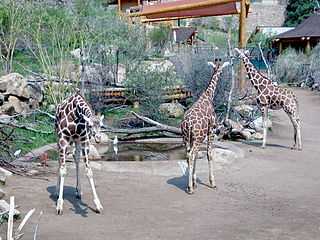Cheyenne Mountain Zoo
|
Cheyenne Mountain Zoo Logo | |
|
Three members of the zoo's large giraffe herd | |
| Date opened | 1926 |
|---|---|
| Location | Colorado Springs, Colorado, USA |
| Coordinates | 38°46′12″N 104°51′18″W / 38.77°N 104.855°WCoordinates: 38°46′12″N 104°51′18″W / 38.77°N 104.855°W |
| Land area | 140 acres (57 ha) (40 acres (16 ha) in use)[1] |
| Number of animals | 750[1] |
| Number of species | 150[1] |
| Memberships | AZA[2] |
| Website | www.cmzoo.org |
Cheyenne Mountain Zoo is America's only mountainside zoo, located southwest of downtown Colorado Springs, Colorado on Cheyenne Mountain in the United States at an elevation of 6,800 feet (2,100 m) above sea level. The Zoo covers 140-acre (57 ha), of which 40 acres (16 ha) are in use. It is located west of The Broadmoor resort along the slopes of Cheyenne Mountain's lower north end. The animal collection includes more than 750 animals, representing nearly 150 different species, with more than 30 endangered species.[1]
History
The Cheyenne Mountain Zoo was founded in 1926 by philanthropist Spencer Penrose to house his growing collection of exotic animals. In 1938, after substantial development, Penrose incorporated the Zoo as a non-profit public trust to the people of Colorado Springs. This trust was deemed "for the sole purpose of establishing and maintaining a zoological park to provide recreation, education, conservation and scientific facilities in the field of zoology and related subjects, and to preserve the Zoo in perpetuity for the people of the Pikes Peak region."[3]
As an independent, non-profit 501(c)(3) organization, Cheyenne Mountain Zoo is one of only a handful of Association of Zoos & Aquariums (AZA) accredited zoos in the country that does not receive local or regional public tax support, nearly 100 percent of the Zoo's income is generated from earned revenues, gate admissions, gifts, membership dues, donations, and corporate sponsors and grants.[4]
Exhibits
Cheyenne Mountain Zoo tries to continuously create new and updated exhibits that let visitors become active participants in their visit, encourage an appreciation and respect for the dignity and intrinsic value of all living things, and challenge the visitors to make a difference in the natural world.[5]
Animal exhibit highlights: Rocky Mountain Wild, African Rift Valley, Wolf Woods, My Big Backyard, Encounter Africa, Australia/Budgie Buddies, Asian Highlands, Aquatics, Monkey Pavilion and Primate World.[1]
Signature Animal: Reticulated giraffes flourish at the Cheyenne Mountain Zoo's African Rift Valley exhibit and are the largest herd in the United States. The public is able to hand feed romaine lettuce for a fee to the giraffes at inside or outside enclosures. The Cheyenne Mountain Zoo giraffe breeding program is the most prolific in the world with 199 births since 1954.[1] There is also a giraffe web cam for online giraffe viewing or the herd outside along with zoo guests.[6]
Unique Animals: Okapi, moose, Amur leopard, Amur tiger, grizzly bear, North American river otter, Hoffmann's two-toed sloth, Mexican gray wolf, Nile hippopotamuses, African lions, Rocky Mountain goats, naked mole rats, black-footed ferret and African elephants. .[1]
Other facilities
The zoo has a refurbished historic 1937 Carousel, the Mountaineer Sky Ride (an open air chairlift-style ride that leads to an event area of the zoo not reachable to guests on foot), the Shongololo Choo Choo Tot Train, pony rides, a fire tower, food shops, and gift shops. Visitors can tour the zoo on the Zoomobile/tram which is handicapped and stroller accessible.[1]
Admission to the zoo includes the Russell Tutt Scenic Highway and Will Rogers Shrine of the Sun for that day, weather permitting.[1]
Notes
- ↑ 1.0 1.1 1.2 1.3 1.4 1.5 1.6 1.7 1.8 "Cheyenne Mountain Zoo ‘America’s Mountain Zoo’ 2010 Fact Sheet". www.cmzoo.org. Cheyenne Mountain Zoo. Retrieved 21 July 2010.
- ↑ "List of Accredited Zoos and Aquariums". aza.org. AZA. Retrieved 8 July 2010.
- ↑ "About The Zoo - History". Cheyenne Mountain Zoo. 2010-08-01. Archived from the original on 2010-08-01. Retrieved 2015-03-01.
- ↑ "Cheyenne Mountain Zoo – Non-Profit Status". Cheyenne Mountain Zoo. 2010-07-25. Archived from the original on 2010-07-25. Retrieved 2015-03-01.
- ↑ "About The Zoo - Our Future". Cheyenne Mountain Zoo. 2010-07-29. Archived from the original on 2010-07-29. Retrieved 2015-03-01.
- ↑ "Cheyenne Mountain Zoo – GiraffeCam". Cheyenne Mountain Zoo. 2010-07-16. Archived from the original on 2010-07-16. Retrieved 2015-03-01.
References
- In Between the Spots at Cheyenne Mountain Zoo - Blog
- Cheyenne Mountain Zoo and the Palm Oil Crisis - Blog
- Cheyenne Mountain Zoo Frog Blog
External links
![]() Media related to Cheyenne Mountain Zoo at Wikimedia Commons
Media related to Cheyenne Mountain Zoo at Wikimedia Commons
| ||||||||||||||||||
| ||||||||||||||||||||||||||

